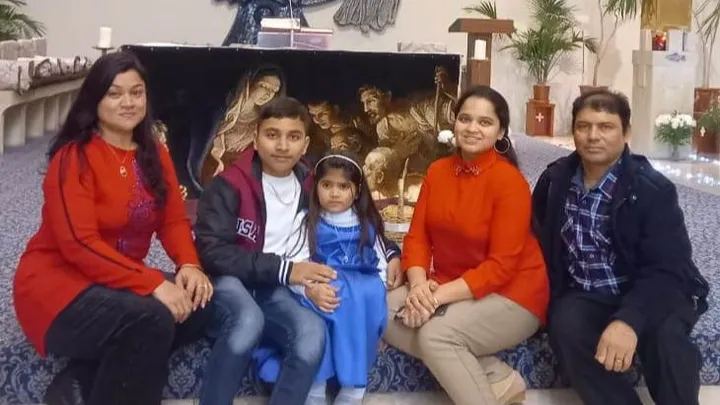I’m not sure I’ve ever known anyone a bit like Michael D’Souza. We met almost ten years ago in a Redemptorist parish in downtown Bangkok, where I had just moved with my young family. Michael, even among the parish’s large community of Pakistani asylum seekers, stood out. After the week’s masses, when most of the attendees had left, he would approach the tabernacle on his knees, rosary and prayer book raised as he offered desperate prayers to God. If he was looking to draw attention to his piety, this wasn’t exactly the most opportune time.
I quickly learned that nothing was affected about Michael. He was as serious as possible and had a unique mind. He, his wife and two children had fled Pakistan after Muslim extremists (repeatedly) physically attacked him, threatened his life and kidnapped members of his extended family. Michael was waiting for the United Nations to rule on his request for refugee status. For years, the D’Souzas waited in Thailand, during which time they had a third child and worked odd jobs to earn some money.
Their request to the UN was rejected, as was their appeal. Having overstayed their Thai visas, the D’Souzas were twice imprisoned in Bangkok’s infamous immigration detention center, a filthy and corrupt facility run by Thai authorities. By then, my wife and I were intimately involved in the D’Souzas’ lives: I had written several articles for miscellaneous Catholic publications on their (and other Pakistanis‘) and we regularly visited them in the IDC to deliver food and other basic necessities.
Orthodox. Faithful. Free.
Register to get Crisis articles delivered daily to your inbox
Things got worse at the IDC during the D’Souzas’ second long stay: the family’s health deteriorated, crammed into small quarters with hundreds of other people; and a Thai guard took an alarming interest in Michael’s teenage daughter. When Michael and his wife begged us to help them return to Pakistan, we raised the necessary funds with the help of a few friends and family.
And yet other terrors awaited them in Karachi. In time, Muslim thugs recognized Michael, I beat him almost to death, and destroyed the motorized rickshaw which was his only source of employment. During (and after) Michael’s recovery, his family lived under house arrest to avoid the attention of Muslim thugs. (The global pandemic was an unexpected boon for them, as it also forced the D’Souzas’ tormentors to return home.)
The D’Souzas tried to flee twice, once via Russia to Poland, then to Sri Lanka. Both times, they were deceived and exploited by human traffickers and forcibly returned to Pakistan. In 2022, by the grace of God, they found temporary asylum in Azerbaijan, their application for refugee status was reopened to the UN. However, things are not looking promising. Local Azerbaijani immigration authorities told Michael that their case would soon be closed if no repatriation sponsor was identified, which would mean returning to Pakistan again.
For most of us in America, we regularly make significant changes to our lives without fear of imminent ruin. We change jobs, homes, schools, cities. For Michael and his family, their choices have been paralyzed by factors beyond their control: Muslim extremists who aim to convert or kill them, confounding government and international bureaucracies whose regulations require advanced degrees to qualify. find it there.
So this Pakistani Catholic family moves from place to place, trying one failed option and then another, barely surviving on the edge of existence. Instead of graduating from college or starting a family of her own, Michael’s eldest daughter works with her mother, earning ten dollars a day at an Indian restaurant in Baku.
Yet, much to the surprise of my often deflated and cynical view on the plight of the persecuted Church, there is still hope. Recently, my mother-in-law, who was intimately involved with the D’Souzas since my family lived in Bangkok, contacted the Office for Refugees in Toronto (ORAT). ORAT sponsors approximately 700 to 800 refugees per year with the Canadian government. They even accept applicants who have not been designated refugees by the UN. But the price to open an application costs $50,000.
This is the reason for my call to youreaders of Crisismany of whom have already helped Pakistani Catholics whom I have profiled in articles for the magazine, an interview on his podcast and my 2021 book, The persecuted, published with Sophia Institute Press. My wife and I and her parents donate money to this cause. But we will need the help of many friends to get this kind of money. We created a GoFundMe page for anyone interested and wishing to support the D’Souzas cause in Canada.
I’ve often felt hopeless at the many obstacles (and defeats) the D’Souzas have faced over the past decade. But I hope that we might very well have identified a real life-saving operation for this devout Catholic family who so desperately wants to start a new life. I humbly ask you, Crisis readers, to prayerfully consider contributing to this cause. For any questions about this campaign, please contact my mother-in-law, Christine Caveness, at (email protected). God bless you!


